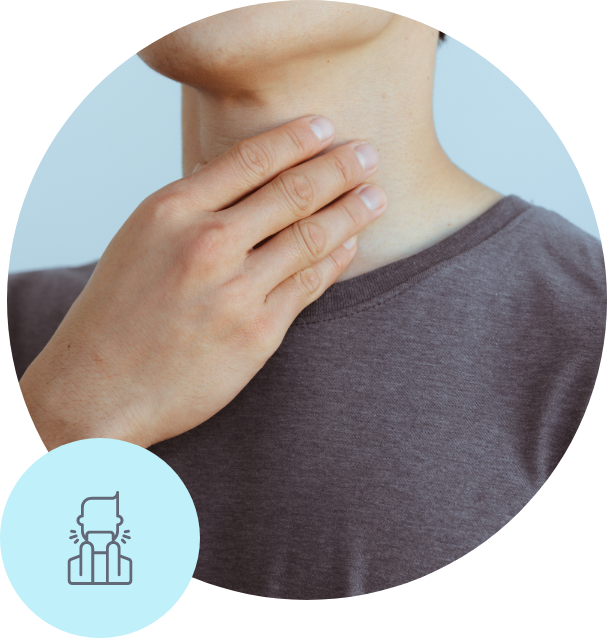Persistent Cough
Coughing is one of the three “classic” symptoms patients experience during an active Covid infection, along with a loss of smell and fever. The cough starts to subside for most people after recovering from the virus. But some patients have a lingering cough that can last for months after having Covid. In fact, some researchers have suggested that an estimated 5% of Covid patients have an ongoing post-Covid cough that lasts for a month or more.
Our medical team is here to assist with post-Covid coughing and other long-haul symptoms. If you have recovered from a Covid infection but are still experiencing symptoms, we invite you to reach out to learn more about available treatment options.

Symptoms: Coughing Post-Covid
When you are sick with an upper-respiratory infection, such as Covid, coughing is a reflex in the body that helps to minimize irritation in the tract from germs and dust. The cough reflex is triggered if the nervous system senses a foreign substance. Pressure builds in the lungs. Then the larynx opens to release the air and clear away the irritants.
Providers are unsure why people continue to have a lingering cough after Covid. It could be an underlying inflammation in the upper respiratory tract, causing hypersensitivity or swelling.
Common symptoms associated with post-Covid coughing include:
- Coughing
- Frequently clearing the throat
- Shortness of breath
- Dry cough
- Postnasal drip
- Sore throat
- Hoarseness
These symptoms might be mild, such as a few small coughs that occur randomly throughout the day. Some patients have unexplained coughing fits.
Treatment for a Post-Covid Cough
Just because you are experiencing a lingering cough after Covid doesn’t necessarily indicate that you will have long-term health issues. But it’s always a smart idea to consult a Covid specialist to rule out anything serious.
Most coughs will subside over time. If you are still coughing a few weeks after Covid, then reach out to our team for medical support. Coughing that lasts for more than 3 months is a concern since it could be an indication of post-Covid interstitial lung disease. Don’t wait to talk to a provider if you notice other symptoms with your coughing, such as the presence of blood or a change in the type of cough.
Available treatments for a post-Covid cough might include:
- Over-the-counter cough suppressants to manage the symptoms
- Antihistamines or decongestants to treat postnasal drip
- Corticosteroids to reduce inflammation in the upper respiratory tract
- Inhaling asthma drugs to open the airways
- Antibiotics (if the cough is related to a bacterial infection)
- Hydration to clear the airways and support overall health
- Sucking lozenges to soothe the throat
- Lung function tests to measure the air the lungs can hold
If lung scarring is present, then it’s critical that you work with a specialist to optimize breathing and reduce the risk of long-term complications.